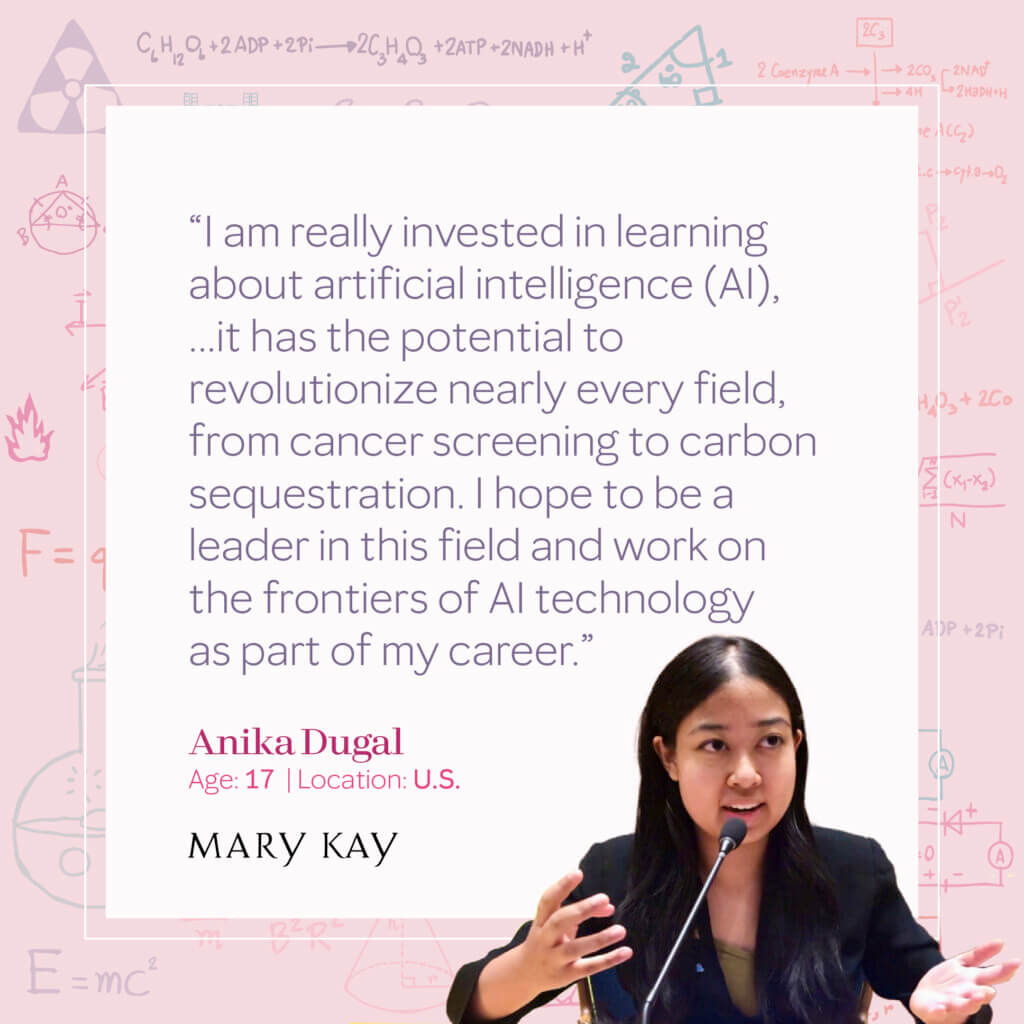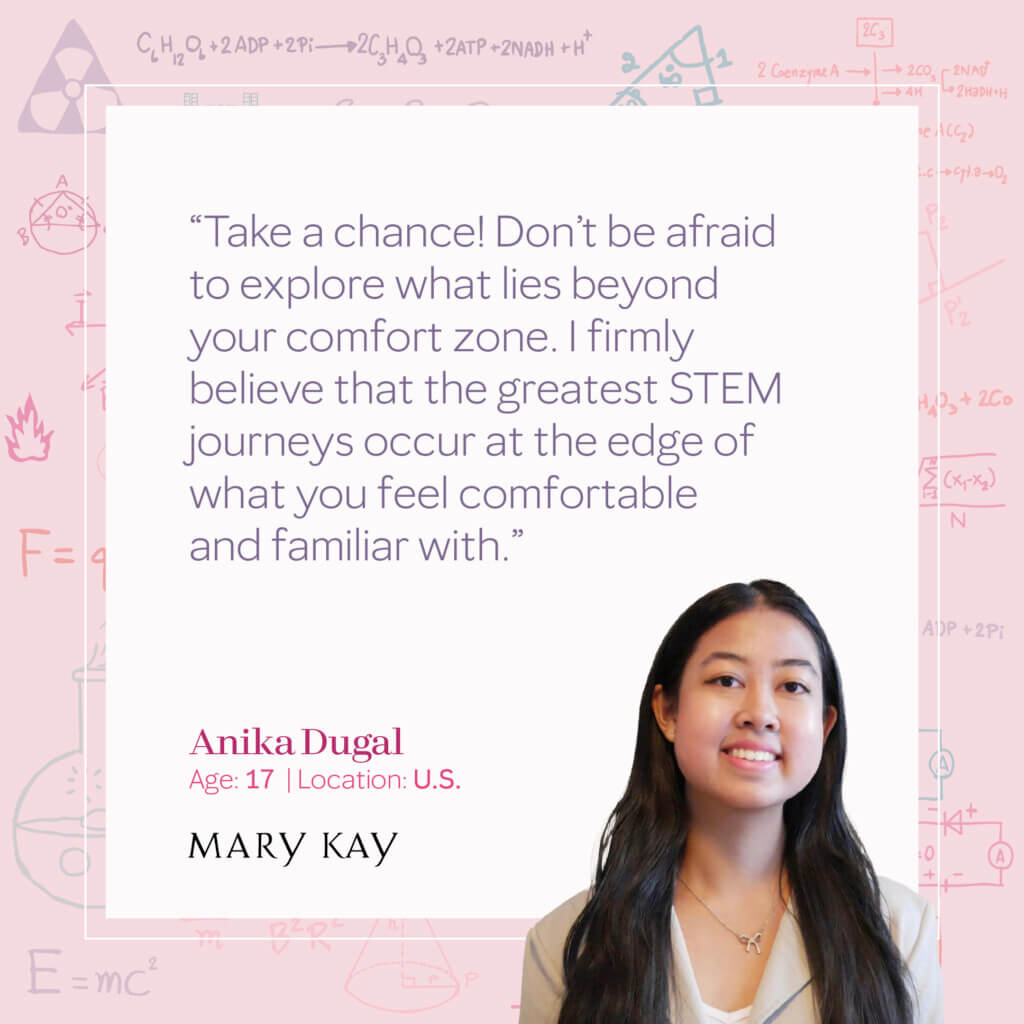Computer Scientist | Founder, Girls for Algorithmic Justice | National Cyber Scholar
In 2020, Mary Kay launched the Young Women in STEM (Science, Technology, Engineering and Math) grant program and social campaign to help shift the perception of “the face of science,” and encourage young women to pursue STEM paths. Since then, we have awarded nearly 20 grants to young women in STEM.
Meet Anika Dugal! Anika is a computer scientist, National Cyber Scholar and one of our 2023 Young Women in #STEM grant recipients. Anika is passionate about STEM and how it supports social justice work, that’s why she founded her nonprofit, Girls for Algorithmic Justice, the largest and first-ever algorithmic justice organization led by female students. Anika strongly believes that STEM is the future and it’s important that everyone take a chance and explore.

Describe your STEM projects/interests.
I am passionate about the intersection of STEM with social justice work, such as protecting human rights, and try to weave this dualism into all my STEM projects. For example, my proudest STEM achievement is founding Girls for Algorithmic Justice (GFAJ), a 501(c)(3) nonprofit that is the largest and first-ever algorithmic justice organization to be led by female students. We now have a core team of 180+ volunteers, programs that have directly impacted over 2,000 students, as well as 7 chapters in schools across the globe. We have met with dozens of members of Congress and other legislative officials to advocate for bills that promote equitable technology, such as the Algorithmic Accountability Act and the Facial Recognition & Biometric Technology Moratorium Act.
Another STEM achievement that is especially meaningful to me is that I was selected as 1 of 6 students to organize Youth STEM 2030’s Research Conference this year. The research conference was a gathering of 700+ youth from 55+ countries to discuss global progress in enacting the Sustainable Development Goals. As a conference organizer, I facilitated panels, moderated discussions, etc. I also served as the Chair of the “AI for Global Challenges” panel, which consisted of grad and post-grad AI researchers discussing the nexus of AI with global issues.
Outside of my experience with holding events or organizing initiatives, I have received numerous accolades recognizing my achievements in STEM. For example, I was named a 2023 National Cyber Scholar, as one of the top 3% of over 42,000 applications for the scholarship. The scholarship was selected based on top scorers on an exam that tested advanced ethical hacking and cybersecurity knowledge. Similarly, I also placed 1st in FBLA’s Computer Problem Solving event at the National Leadership Conference, out of thousands of competitors.
What/Who inspired you to get into STEM?
I have grown up surrounded by STEM, so perhaps it was inevitable that I fell in love with it! My parents both work as software engineers; their passion for their work has been woven into my upbringing, whether through hearing them debate the merits of VMWare vs. Virtual Box (two competing virtual machines, or online computer environments for testing code) at the dinner table or peeking over their shoulder to see them rapidly typing Java code on their laptops. Growing up immersed in computer science was what first spurred me to learn more about the field. One thing led to another, and I am now a proud lover of many things related to computer science.
What are some advantages you think being a female brings to the STEM field?
Rather than being a disadvantage, I believe that being a female-identifying person in STEM is an advantage. This is because women are uniquely positioned to develop products that reach a large group of people and therefore maximize their impact. For example, in the U.S., nearly every company is committing to adding more employees from marginalized groups to their workforce, especially women. Current female employees are arguably the best resources for companies as they figure out how to recruit female employees, and can offer invaluable insights, based on what first compelled them to volunteer with GFAJ, etc.
I also believe that identifying as female makes me cognizant of certain inequities in STEM – I have seen firsthand how people from certain marginalized groups sometimes struggle to make their voices heard in fields like STEM. It is a constant puzzle to solve – how to express my thoughts, without being labeled “pushy” or “bossy” – but has opened my eyes to the discrimination that still exists in our world and made me highly invested in solving it.
What would you tell young girls who are interested in STEM, but too intimidated or discouraged to pursue it?
Take a chance! Don’t be afraid to explore what lies beyond your comfort zone. I firmly believe that the greatest STEM journeys occur at the edge of what you feel comfortable and familiar with. I would encourage them to proactively explore the areas of STEM that pique their interest, such as by watching online STEM videos, participating in STEM programs at their school, etc. STEM truly is the future, and I believe that a working knowledge of STEM is essential, no matter what field you plan to go into. The beauty of STEM is that everyone has their own foray – there is no one set way to learn more about STEM. I would also advise trying to find someone who has STEM experience who could perhaps guide you through learning more about certain fields, such as a teacher, family member, or trusted friend.

What do you think is most exciting about the future of STEM, and is there a specific advancement you’d like to see happen?
I think that the most exciting aspect of the future of STEM is the near-boundless potential that technology brings. For example, I am really invested in learning about Artificial Intelligence (AI), as I believe that it has the potential to revolutionize nearly every field, from cancer screening to carbon sequestration. I hope to be a leader in this field and work on the frontiers of AI technology as part of my career. However, with the immense potential of AI comes consequences. One of the largest concerns about AI is its propensity to discriminate toward already marginalized groups – such as women, people of color, etc. – which only exacerbates the discrimination that these groups already face. For example, many AI-based or AI-integrated technologies are fueled by data that is inherently biased toward certain groups, leading to biased results. To build a future where AI is used in an equitable and responsible manner, I believe that it is crucial that corporations and governments commit fully to testing their AI products for equity before being released for public use, in tandem with legislation that requires organizations to do so.
Who’s your favorite female icon and why?
My personal icon is Ruth Bader Ginsberg, the esteemed Supreme Court justice and women’s rights activist. Ginsberg is my icon because of the sheer tenacity that marked her character, which helped her transcend her adverse circumstances, including poverty and gender-based discrimination. She leveraged her position to enact tangible progress for American women’s rights, such as by arguing in United States v. Virginia that qualified women could not be denied admission to Virginia Military Institute, spoke out against the practice of paying women less than their male counterparts in Ledbetter v. Goodyear Tire & Rubber Co., and many more. She is the perfect example of academic drive, intellectualism, determination, hard work, and a commitment to enacting change: I hope to incorporate these same characteristics into my own career.